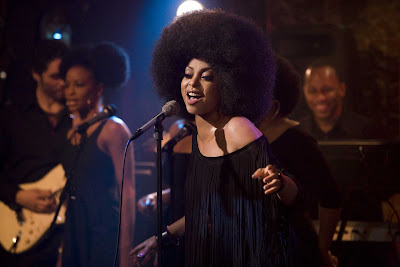
Black folks are sensitive about our image, and for good reason. Our history is one of misrepresentation, of dehumanization, one in which the act of a single bad apple is used to denigrate the entire race.
And when you look to Hollywood, you see a legacy of images seared into our public consciousness, one that elevates buffoonery and obscures our dignity. So anyone surprised by the controversy surrounding the movie Precious: Based on the Novel Push by Sapphire just hasn't been paying attention.
Here we have a story about a obese, illiterate black girl who has birthed two children by her own father and endures horrifying physical and sexual abuse by her mother, poor dysfunctional black people living in the grittiest of conditions.
Precious exists, and so does her mother, Mary, and her father, Carl. They exist even though we don't want to see them. They exist even though we pretend they are as invisible as Ralph Ellison's narrator in Invisible Man.
The problem is that when it comes to Hollywood, it seems as if that's the only image we see, as if every black family is that messed up, that we all live in the ghetto, that bullets fly all the time in all of our neighborhoods. And when that happens, all the nuance of black life is lost.
This is why us black folk are so sensitive and it's why some people have reacted to
Precious like this
guy.
It was in this context that I approached the film, directed by the ever-provocative Lee Daniels, who made the equally controversial Monsters Ball. That movie garnered Halle Berry an Academy Award in a performance some raved as powerfully raw and others criticized as playing into the most awful stereotypes surrounding black women.
Given all the controversy about this movie, I ended up carried away by the simplicity of the storytelling and the pain-drenched performances by everyone. Daniels knows something all good storytellers know -- less is more.
He shows restraint in places where the novel itself is unflinchingly graphic. The abuse is there, but he pulls back just a bit.
More importantly, he allows Precious to tell her story. That's where the power of the novel and this movie lies, in Precious' voice, her ever-growing ability to tell her tale, both of tragedy and triumph.
It is in her broken English that she founds, gradually, the power of words.
Daniels allows us entry into her world, her confusion about her circumstance, her desire for something better, her anger at her abuse, her fantasies of being a superstar with a light-skinned boyfriend. Precious is a girl who knows not the meaning of her name, who is bowed down in self-hatred, who has never known love.
As teacher Blue Rain, who heads up an alternative school that Precious is sent to, Paula Patton is the shining light of love that Precious needs. And so are the others who come into her life, the students in Ms. Rain's classroom, the nurse (played by rocker Lenny Kravitz) and the social worker (portrayed by a nearly unrecognizable Mariah Carey).
But the revelation is Gabourey Sidibe, a relative newcomer in the game of acting, who fully inhabits Precious in a performance transforms stereotype into fully-realized human.
And comedian Monique gives a horrifying and heartbreaking performance as Mary, Precious' abusive mother who is wholly ignorant to her monstrous behavior.
But the movie isn't without its problems. I wonder, as others have, why the good characters in this movie, such as teacher Blue Rain, are light-skinned, while Precious and her parents, the most dysfunctional people in the movie, are all dark-skinned. Lee Daniels has said in interviews that he has had issues with colorism, that discrimination that black people practice against each other, and it shows in his casting.
The other problem I have is the ending. We find Precious dealing with the fact that she is HIV positive in a movie set in the late 1980s. I wondered what would happen to her? How long would it be before she died? Would she complete her education? Would she find work? Would she find a way to take care of her two children, one of which has down syndrome?
Neither the movie nor the novel answers those questions. We are only left with the hope that Precious' new-found determination and desire for better things will help her overcome her obstacles.
But in the end, I liked the movie. I saw the movie as art, as one that challenges us and moves us beyond our comfort zones, to get to a truth we may otherwise not want to see. I don't want to see just positive images of black people. And I don't want to see just negative images of us.
I want to see us as who we really are, human beings, flawed, some of us good, some of us bad, some of us in-between, complex, complicated, four-fourths man and woman. Human. The bottom line is that all of our stories deserve to be told, not just this one.












